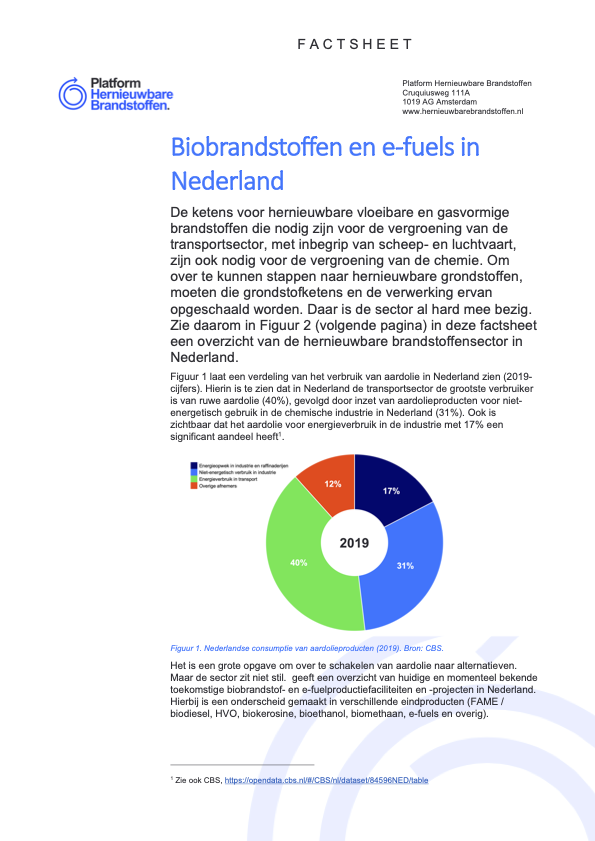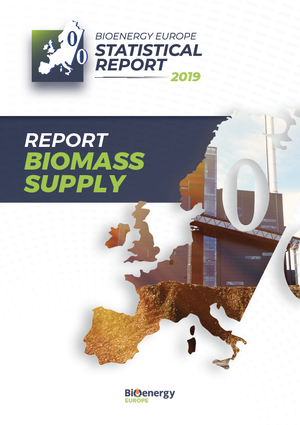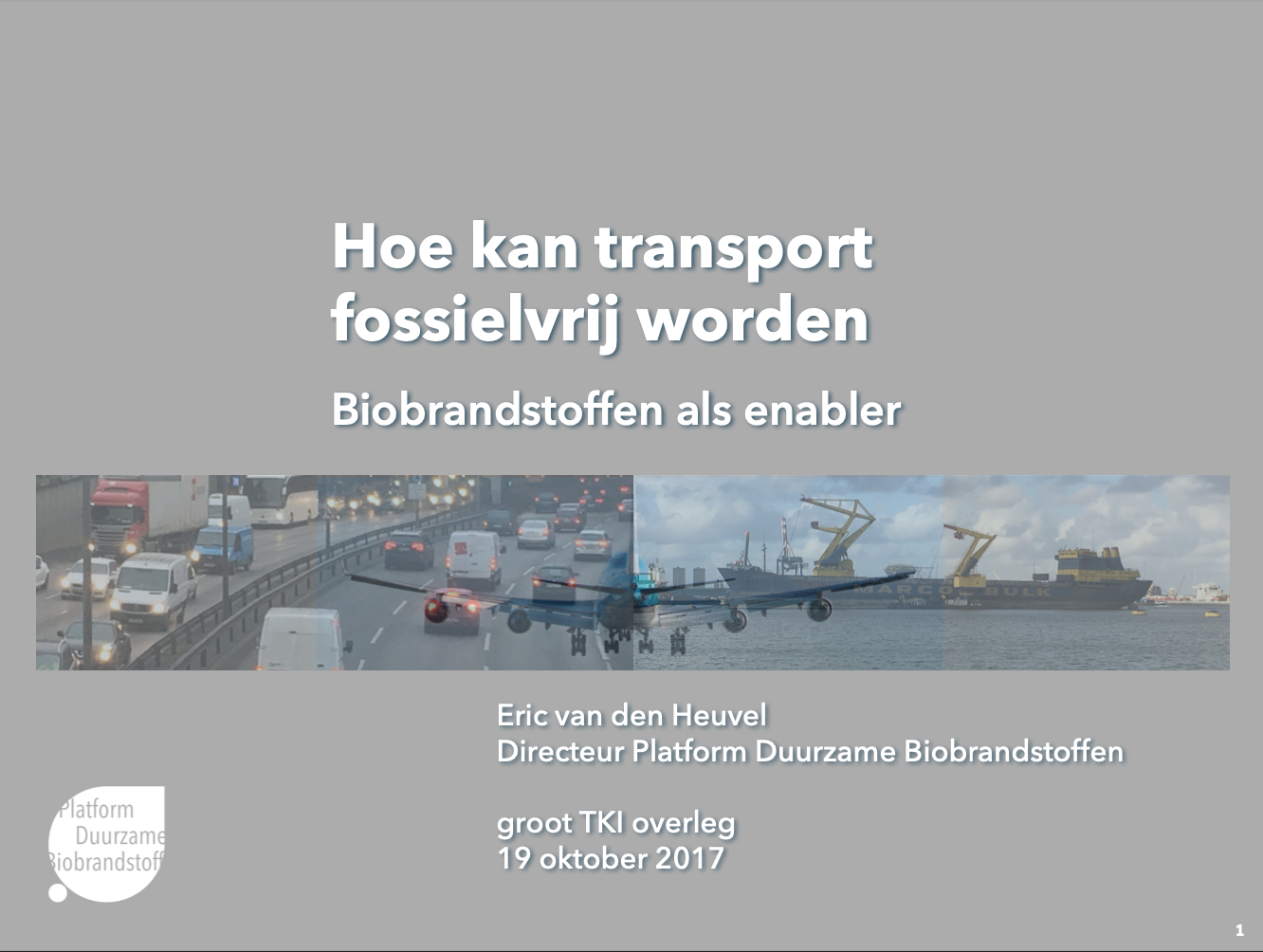Filter opties

Biomass and feedstock availability
NOVA Institute: Sugar as Feedstock for the Chemical Industry | 2019
A comprehensive sustainability assessment shows that first generation sugars are as advantageous as second generation sugars for a feasible and sustainable resource strategy of Europe’s bio-based chemical industry.
.png)
PHB: Factsheet Biobrandstoffen en e-fuels in Nederland | 2022
Een factsheet met een overzicht van van huidige en (op dit moment bekende) toekomstige productiefaciliteiten en -projecten voor biobrandstof en e-fuels in Nederland.

WUR presentation on biomass and biobased economy
A chapter from Wageningen University & Research's project showcase magazine, highlighting their biomass research initiatives such as BECOOL, BIKE and more. It talks about indirect land use change, logistics challenges and economic opportunities when it comes to utilizing biomass.

Bioenergy Europe: Statistical Report Biomass Supply | 2019
Bioenergy Europe's 2019 statistical report on biomass supply in Europe. Bioenergy Europe's 2019 statistical report on biomass supply in Europe. Bioenergy Europe's 2019 statistical report on biomass supply in Europe.

Gerlagh & Sinnige (RVO): Biomassa Beschikbaarheid–De stand van zaken | 2018
Een presentatie van Timo Gerlagh & Paul Sinnige van RVO, over de beschikbaarheid van biomassa in Europa. Een presentatie van Timo Gerlagh & Paul Sinnige van RVO, over de beschikbaarheid van biomassa in Europa.

Probos: Beschikbaarheid van Nederlandse verse houtige biomassa in 2030 en 2050 | 2018
In deze studie (door Probos, in opdracht van RVO) is het Nederlandse houtige biomassa-potentieel in beeld gebracht en zijn daarnaast de vraag en het aanbod van lokaal beschikbare houtige biomassa in een aantal scenario’s met elkaar geconfronteerd.

EC JRC: Biomass production, supply, uses and flows in the European Union | 2018
The European Commission Joint Research Center made a broad assessment of biomass usage and availability within the EU. This report presents their findings and introduces new frameworks for the analysis of the environmental impacts of biomass supply chains.

IEA Bioenergy Task 37: Green Gas–Facilitating a future green gas grid through the production of renewable gas | 2018
This report outlines the various substrates and technologies for green gas production and examines how much natural gas can be replaced by green gas in specific countries.

EC ART Fuels Forum: Technology Status and Reliability of the Value Chains: 2018 Update | 2018
An update by the European Commission ART Fuels Forum to the report of the Sub Group Advanced Biofuels (SGAB) titled "Technology status and reliability of the value chains" from 2017.

EC Sub Group on Advanced Biofuels: Building Up the Future–Final Report | 2017
The Sub Group on Advanced Biofuels was created on the recommendation of the Sustainable Transport Forum (STF) as a consultative group. Its mandate is to develop appropriate strategies and recommendations which could facilitate the deployment and use of advanced biofuels in EU...

Van den Heuvel: Hoe kan transport fossielvrij worden–Biobrandstoffen als enabler | 2017
Presentatie van Eric van den Heuvel, directeur van het Platform Duurzame Biobrandstoffen, over de betekenis van biobrandstoffen in het terugdringen van de klimaatimpact van transport in Nederland.

IEA: Biofuels for the marine shipping sector | 2017
An overview and analysis of the shipping sector infrastructure, fuel technologies and regulations to explore the options for biofuel deployment in this sector.

Full Opinion by the Netherlands Platform Renewable Fuels on the proposal for revision of Annex IX of the Renewable Energy Directive
The Netherlands Platform Renewable Fuels would like to take the opportunity to provide feedback on the proposed delegated act that aims to update the list of feedstocks in Annex IX of the EU/2018/2001 Renewable Energy Directive (REDII).
PHB: Delegated Act Feedstocks Advanced Biofuels Undermines Investor Confidence
At the end of 2022, the European Commission submitted for public consultation the delegated act concerning an update of the feedstock list for advanced biofuels. The Netherlands Platform Renewable Fuels has put forward that the sector needs a certain level of investment security.
PHB: Reactie op Kamerbrief Min. I&W Voortgang Duurzaam Vervoer | 2023
Commentaar van het Platform op de kamerbrief van het Ministerie van Infrastructuur en Waterstaat van 13 januari 2023, waarin een update gegeven wordt van de stand van zaken met betrekking tot de verduurzaming van de Nederlandse mobiliteitssector.
TwynstraGudde: Biomassa in Mobiliteit | 2022
TwynstraGudde heeft voor het Ministerie van Infrastructuur en Waterstaat een rapport gemaakt over de kansen, knelpunten en samenhang in de toepassing van biomassa in duurzame mobiliteit. Specifiek gaat het om de scheepvaartsector, luchtvaartsector en wegtransport.
.png)
f3: Methanol as a Renewable Fuel – A Knowledge Synthesis | 2017
The objective of this report is thus to create a knowledge synthesis with this long term perspective in mind and to look forward and address methanol’s potential role as energy carrier/motor fuel in Sweden (and elsewhere).

E4tech - Ramp up of lignocellulosic ethanol in Europe to 2030 | 2017
This study has been commissioned by the co-sponsors of the 6th International Conference on Lignocellulosic Ethanol to provide an overview of the current status of the lignocellulosic ethanol industry, how it could realistically ramp up by 2030 in the EU, and the resulting costs.

E4tech: Advanced drop-in biofuels – UK production capacity outlook to 2030 | 2017
The aim of this study is to evaluate the UK potential for production of advanced drop-in biofuels to 2030. This analysis is based on a wide base of evidence, which considers: technology development to date and the remaining technical barriers to commercialisation...


